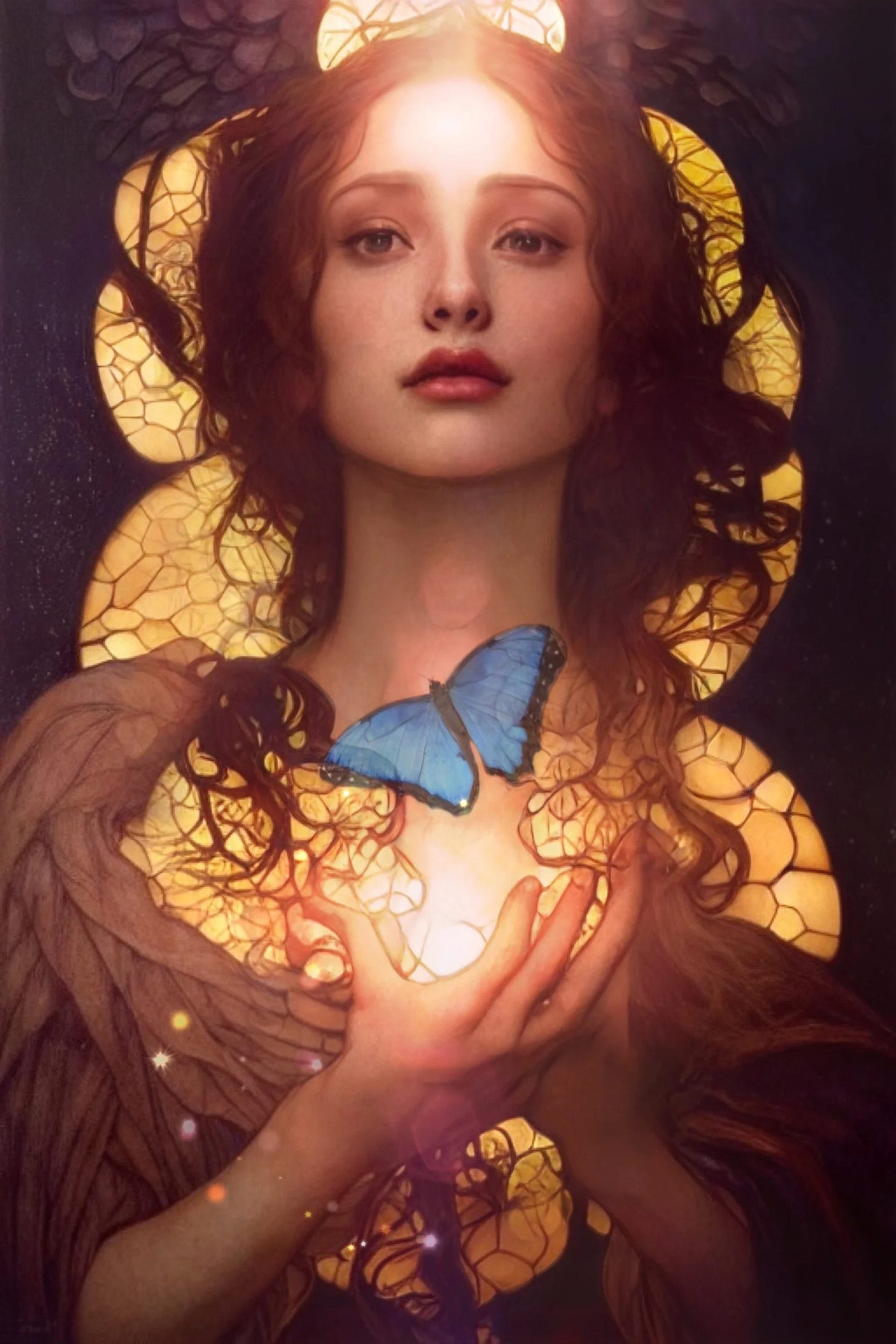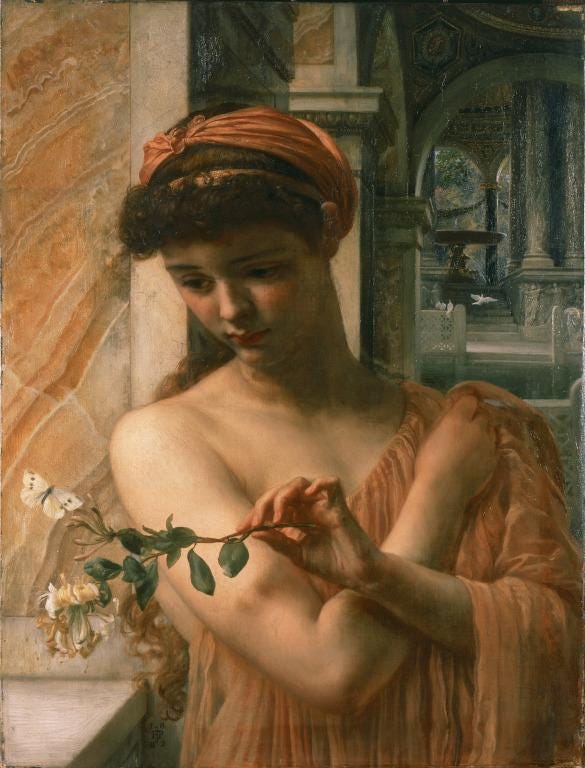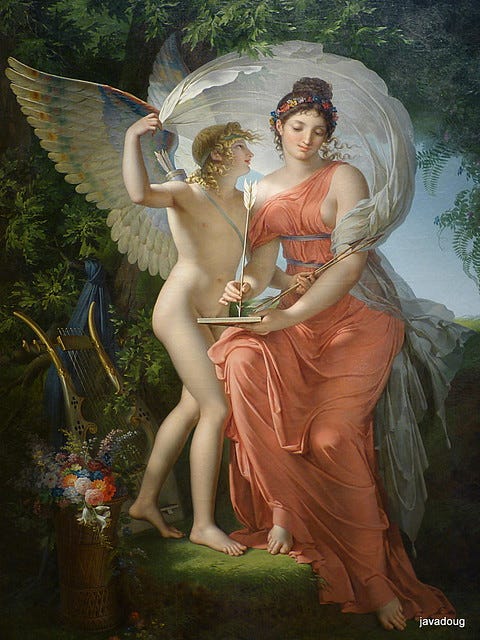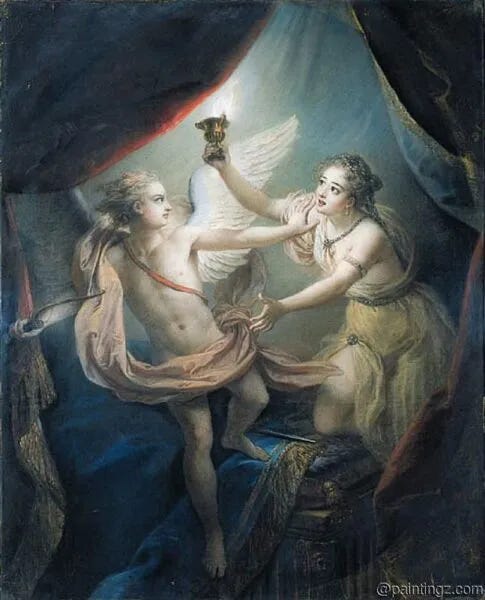The Fairy Tale Heroine: Live and Create Her Journey
Chapter Six, Impossible Tasks, Part I

Eons ago, a heroine fairy tale of the Near East morphed into an exalted Greek myth in a rarified drama on Mount Olympus, the compelling tale of “Psyche and Eros.” Often considered a romantic story of secret love between the human princess, Psyche, and the Greek god, Eros, it’s also been interpreted as an illuminating guide for feminine development by modern Jungian analysts. No doubt, this is a profound tale.
What makes the story of “Psyche and Eros” so complex are its woven narratives. Which threads are seen as prominent: Is it a tragic search for love or the brave journey of the heroine? Perhaps it is both. No matter what view one takes, this mythic tale showcases some of the most powerful, archetypal characters of folk literature, that of Aphrodite, Psyche, a pantheon of Greek goddesses, and some meddling male gods.
The Golden Ass
Though the fairy tale existed within a far reaching oral tradition and scenes from the tale were evidenced in Greek and Roman mosaics and bas-relief sculptures, there was a popular, written version that withstood the fall of the Roman Empire and garnered fame when rediscovered in the Renaissance.
This classical version of the tale is from an unlikely source, thought to be the only surviving Roman novel in its entirety, written by Apuleius (circa 160 CE) titled The Transformation of Lucius or the Golden Ass. Some claim it as the first novel in Western literature; it is certainly entertaining, with stories within stories. Its bawdy, picaresque romp revolves around Lucius who has an overwhelming desire to practice magic. But his schemes go awry when he takes the wrong potion, says the wrong spell, and is transformed into an ass instead of an owl.
In his ass form, Lucius has a rapid series of incredible adventures, bestial in nature, though possibly metaphorical, with inset tales from other sources. At one point, he is stolen by a gang of mountain bandits and taken to their hideout cave. Though a donkey, he is nevertheless human and able to overhear their plans. He is joined by a wealthy bride who was brutally kidnapped on her wedding day, held captive for ransom, and left with a caretaker old woman.
The servant woman seeks to entertain and soothe Charite, “Now let me tell you a fairy tale or two to make you feel a little better.” Unknown to them, Lucius is listening.
Of all the writings of Apuleius, this fairy tale is by far the most renowned. Since its rediscovery in the 15th century CE, the story has been retold in poetry, drama, opera, depicted widely in painting and sculpture, even carved on wedding chests. The novel’s literary form and tropes influenced St. Augustine’s Confessions, Boccaccio, Cervantes, Shakespeare’s Midsummer Night’s Dream, and Collodi’s Adventures of Pinocchio, among others. But the inset tale of “Psyche and Eros” endures as Apuleius’ most famous work.
Worldwide Versions
The Motif Index of Folk-Literature, (eds. 1910, 1928, 1961, 2004) that over time established the Aarne-Thompson-Uther tale type index (ATU index) classified this story plot as ATU 425A: Search for the Lost Husband.
Many versions exist in iconic fairy tale collections published in the 19th century:
“East of the Sun and West of the Moon,” —Scandinavian
“The Brown Bear of Norway” Joseph Jacobs—British
“Pinsomalto"—Italian
“The Enchanted Pig” Andrew Lang—British
“The Legend of the White Snake” —Chinese
In these tales, the emphasis is on the perilous journey of the young wife who is sometimes pregnant, to seek her husband, overcoming years of dangerous trials across time and vast reaches of space, frequently with the help of older women who give her advice or tools of magic.
Closely related to this tale type is the plot of Beauty and the Beast or ATU 425C, since Eros, the Greek god of love, presents himself as a “beast” in order to hide his identity from his mother, Aphrodite, and deceive Psyche.
Versions of this tale are extremely well known and live in our collective unconscious. They tell of the power of the feminine to seek out and heal the raging masculine from the curse of a bestial form—certainly a heroine’s journey:
“Beauty and the Beast”—France
“The Enchanted Tsarévich”—Russia
“Zelinda and the Monster”—Italy
“The Snake-Prince”—Greece
These fairy tale heroines are similar to those in the “Cinderella” stories or ATU 510A—those like Vasilisa or Snow White—in that they journey alone into the wilds. But the heroines in search of a spouse are married or in an intimate relationship with a man/beast, not virgins like the Cinderella heroines.
Psyche the Beautiful
The Greek tale of “Psyche and Eros” begins with a princess in a mountain kingdom who is not orphaned, mistreated, or neglected as a Cinderella character might be. However, she chooses to remain isolated, hidden away in miserable solitude rather than be worshiped as a goddess and bear the wrath of the Olympic gods. The aura of mystique around the princess is partly explained by her name: The Greek word, psyche, means both "butterfly" and "soul.” The ancient Greeks believed that human souls became butterflies while searching for reincarnation.
So, the people of her kingdom were drawn to her like moths to a flame: Psyche represented the best part of them, their inner spirit. Not knowing what to call her attraction, they said she had a “strange beauty.”
The Myth
Long ago, in ancient Greece, there lived a princess named Psyche. As Psyche grew into a young maid, all praised her beauty—so strange and wonderful. They said words could not describe it. People in her mountain kingdom began to worship her, calling her the new goddess of love, born of the Earth, not of the Sea.
When the princess went out on her morning walks through the streets, flowers were scattered in her path, rose garlands presented to her, sacred feasts spread for her. She was addressed by titles that belonged to the Great Goddess of Love, Aphrodite.
Psyche found no satisfaction in these honors that placed her beyond the reach of human love. Both her older sisters had married kings, but Psyche stayed behind in the castle, miserable and ill, until she began to hate the beauty everyone else adored.
Even so, the fame of the princess and her magnetic beauty grew, so that no one troubled to visit the temples and love cushions of Aphrodite, the Olympian Goddess of Love—that stunning, seductive beauty born of the sea. They neglected the festivals and rites of the vengeful goddess; her altars were left with old burned sacrifices and withered garlands scattered about.
###
The issue of feminine beauty is timeless and unresolved, and it becomes the continuing conflict of the myth. What is the nature of Psyche’s beauty? We can only surmise that it is the pure aspect of the innocent feminine soul, its transformative power, one that motivates people to think better of themselves and of others. It is a spirituality that appeals to her followers, but is unfulfilling to the princess; she is so elevated in their eyes as to be unapproachable. At the same time she fears the jealousy of the Olympian goddess of love, Aphrodite.
Aphrodite’s Revenge
Psyche’s spiritual beauty is a paradigm shift from the seductive, manipulative, narcissistic lure of Aphrodite; she is “a new goddess of love, born of the Earth, and not of the Sea.” The sea is often an archetypal metaphor for emotional expression, vast, subterranean, suffocating; Aphrodite is a goddess who can drown a mortal with passion and irrepressible urges. In contrast, Psyche’s human love is compassionate and of the Earth, a softening of daily life and human interaction with kindness. No wonder her followers abandoned the love temples of Aphrodite that ensnared them.
Erich Neumann in his commentary on the tale by Apuleius, Amor and Psyche: The Psychic Development of the Feminine (1952) writes, “Psyche ... was ‘a second Aphrodite, newly begotten and newly born’. ... The conflict between Aphrodite and Psyche at the very beginning of the tale shows this to be the central motif.” Neumann, a prominent student of Jung, choose this tale of “Psyche and Eros” as a model of feminine psychology providing keen insights into the psychic life of women. He obviously saw the heroine’s journey to self-realization as the dominant progression in the myth.
The challenges that the goddess Aphrodite hurls at Psyche would become her boons—godsends to self-fulfillment.
Always a vain and jealous goddess, Aphrodite was outraged! “The nerve—a mere mortal maid, a virgin! Who does this girl think she is?”
Aphrodite plotted her revenge. She sent for her winged son, Eros, a perennial young man, always her boy, who carried the weapons of love and hate in his quiver. She greeted Eros, dreaded by all the gods for his unpredictable arrows, and took him to the city where Psyche lived.
“I implore you, darling, as you love your mother, to use your dear little arrows against this impudent girl and destroy her cult. Strike Psyche with a love arrow and cause her to fall in love with a miserable brute of man who would beat her into an early death.”
She kissed Eros long and tenderly then went to the nearby sea-shore and ran along the tops of the waves into her ocean chariot to calm her rage in the deep sea.
###
Like the stepmother in “Snow White,” the jealousy of Aphrodite is absolutely annihilating—to the death. What is different in this plot is the involvement of her masculine aspect, her young, fickle son, Eros, the so-called god of love. In doing so, the myth takes on another layer, a parallel thread, that of the hero’s journey as described by Joseph Campbell. In this case, the “call” is the summons of his mother to destroy her rival.
Meddling of the Gods
Little did Eros know that he would be the one infected with the attraction of pure love.
Eros went to do his mother’s bidding, but when Eros flew to Psyche and looked on her, he wanted her for himself. He conspired with the Great God Zeus to meddle with the oracle of Apollo and her prophecies. Eros knew that Psyche’s father would soon consult the oracle; the old king feared the wrath of the gods for his unwed, much adored daughter.
Asking advice for her future husband, the king received a strange, manipulated answer.
In a trance, the priestess of Apollo chanted: “The groom will be a winged creature—not mortal—and that all—the living and the dead—even Zeus—dreaded him. To marry her awful groom, Psyche must be led to a wild mountaintop in a funeral procession at sunset and left alone for her husband to claim her.”
The stricken king returned home to tell his queen and daughter the tragic decree. Grieving, all the kingdom went in a mournful procession with smoking torches for her funeral-marriage. Singing laments with drums and flutes to a mountaintop, they led Psyche among the stones.
###
The Greek immortals, those duplicitous gods, conspire to set Psyche up for seduction by a gruesome lover to hide Eros’ lust from his jealous mother, Aphrodite. The gods also fear the capricious arrows of Eros—these often wreak havoc in their godly love affairs. But such is Psyche’s parents’ blind belief in Apollo’s oracle that they abandon her to the monster the Delphi foretells.
Wedding Ritual
On the mountain top, Psyche reveals her compassion as she speaks to her parents and people of the kingdom. Her willingness to sacrifice herself for her people demonstrates her heroic courage and humility.
Turning to speak to them all, dressed in coarse garments of heavy wool, Psyche said:
“Why torment yourselves by prolonging your grief? Poor mother, poor father, why spoil the two faces I love best by crying your eyes sore and pulling out your beautiful white hair?
“When people celebrated me as the new goddess of love, that was the time for you to grieve as though I were already dead. The cause of all my misery is the blasphemy of Aphrodite. Why should I hesitate or fear my bridal night? My fate was then cast.”
Left alone, Psyche trembled with fear as she lay among the stones in the moonlight, hoping for sleep, a respite from terror.
###
We can only imagine the horror of human sacrifice as this scene suggests, the virgin offerings of ancient times to appease the gods. Behind the scenes though, we are aware of Psyche’s extreme vulnerability, that she is to be deceived and seduced.
The Awakening
She wakes to the rising sun, surprised that she is still alive. A west wind blows around her, lifting her off the mountaintop, and gently settling her down on a grassy meadow where she finds a shining palace made of silver with a roof carved of sandalwood and open columns of gold.
So it was, that Eros lures Psyche to a magical palace and comes to her in the dark of night, unseen, as her secret husband. Psyche's love is blind until, urged by her jealous sisters, she lights an oil lamp while he sleeps and sees his wings and knows he is Eros, the son of Aphrodite.
When a drop of hot oil falls on his shoulder, Eros startles and flies away to his mother’s Olympian home, leaving Psyche alone as the enchanted palace disappears around her. Psyche lies motionless on the ground, following him with her eyes and moaning bitterly.
She climbs to the bank of a nearby river and throws herself into the water. But the kindly river washes her ashore with a gentle wave. Pan the goat-legged, rustic god happens to be sitting there and beckons her.
“Pretty dear,” he said soothingly, “though I am only an old, old shepherd, listen to me. Make no further attempt at suicide. Stop crying and open your heart to Eros, the greatest of us gods, though he is a thoroughly spoilt young fellow. You will find a way.”
Though it is very lucky to be addressed by the elusive Pan, Psyche makes no reply, numb in her grief, pregnant with the god’s child. She merely nods and walks down the path by the river.
###
That fateful drop of oil from a lamp shining in the dark is her awakening to deceit and to Eros it is an experience of searing pain. Both leave their magical, illusionary palace in grief. At this point their paths diverge, each going separate ways.
In her analysis of the Roman novel, The Golden Ass of Apuleius (1970), Jungian Marie-Louise Van Franz writes, “The symbolism of the lamp, whose oil burns Eros, is double. ... it is the light (not the oil) that drives away the hidden lover. In mythological context light symbolizes consciousness.”
Psyche is left completely alone, however, knowing that Aphrodite would soon discover her son’s secret and seek further revenge—incensed by his disobedience and betrayal. Though tempted to take her life in despair, the river itself and the encouragement of the great god Pan deters her.
Psyche’s is a different crisis than the maiden heroine who flees into the wilderness, like Vasilisa, though she was pushed into lighting the lamp by her jealous sisters. Psyche has already faced her death; she is married and pregnant; she is aware that her enemy will seek her. She is innocent, yet has so much more to lose.
Marie-Louise Von Franz further states in The Golden Ass of Apuleius (1970), “Now Psyche is completely in the dark, and now her real deeds begin with the long and agonizing search to find Eros.”
Pregnant with the god’s child, Psyche flees for her life, fearing the wrath of Aphrodite.
My Eros Story
A single mother in the 1980s, I stayed close to home caring for my young son and the demands of my job. Even so, there were ways to breach my privacy. Someone dialed the wrong number and got my answering machine message. Intrigued or attracted by the sound of my voice, he learned my name and phoned again. When I answered, he called me by name and pretended to know me.
Eventually he admitted he didn’t, but we spoke and he flattered me enough so that I agreed to meet him for coffee. Safe, I thought. But I would never be safe from him, an authentic Romani from a local, well known family, immigrants from Bulgaria whose mother was the only fortune teller in town.
Strikingly good looking with exotic, Indo-European features, tall and lean, with hazel golden eyes, he could have been Krishna, the Hindu god. Entitled, with a swagger and birthright to steal, he was a professional con. We became friends across a divide, both of us interested in life on the other side. I learned the extreme ethic of living outside mainstream culture, the audacity of the trickster to survive.
It was a dangerous friendship and cost me, in money and security, during the two years I knew him. When a job opportunity gave me a reason to move, I was relieved to leave him far behind.
Shortly after my move to the new city, I woke up with nightmares, that he had broken into my house and eaten all the food in the refrigerator, that he was walking down the sidewalk, looking up at the homes on the block. In time, I knew my trail had gone cold.
I’ll never forget his magnetic personality, psychic abilities, his insights on life. But his illusional beliefs were not sustainable—as much as we might want to live on air and walk the tightrope between worlds.
Chapter Six, to be continued
PROMPTS
Do you find Psyche an appealing character? Why or why not?
Did you ever experience a deceptive seduction? What happened?
Do you agree that the central conflict of the myth is between Aphrodite and Psyche? What is the nature of their conflict and, by extension, is this a central issue for all women?








Oh no! A "magnetic personality." I'm out! Xo
Hi Kate, As always, I've enjoyed reading this installment, and wow, your personal story ... that feels worthy of a longer telling!! Will you share more in Chapter 6?
I appreciate the questions in these prompts:
Do you find Psyche an appealing character? Why or why not?
YES ... she feels more yin and vulnerable, a softer feminine.
Did you ever experience a deceptive seduction? What happened?
YES ... Weren't all those "bad boys" seductive? I learned about familial energy patterns and what needed healing.
Do you agree that the central conflict of the myth is between Aphrodite and Psyche? What is the nature of their conflict and, by extension, is this a central issue for all women?
Hmmm ... unfortunately, in the patriarchal myths and fairy tales, women are often pitted against each other, usually through competition, comparison, and ultimately, jealousy. I've met and explored the "jealous sister archetype" quite a bit in my life, and trust / hope women are now rising above it together, remembering our true, cooperative nature.